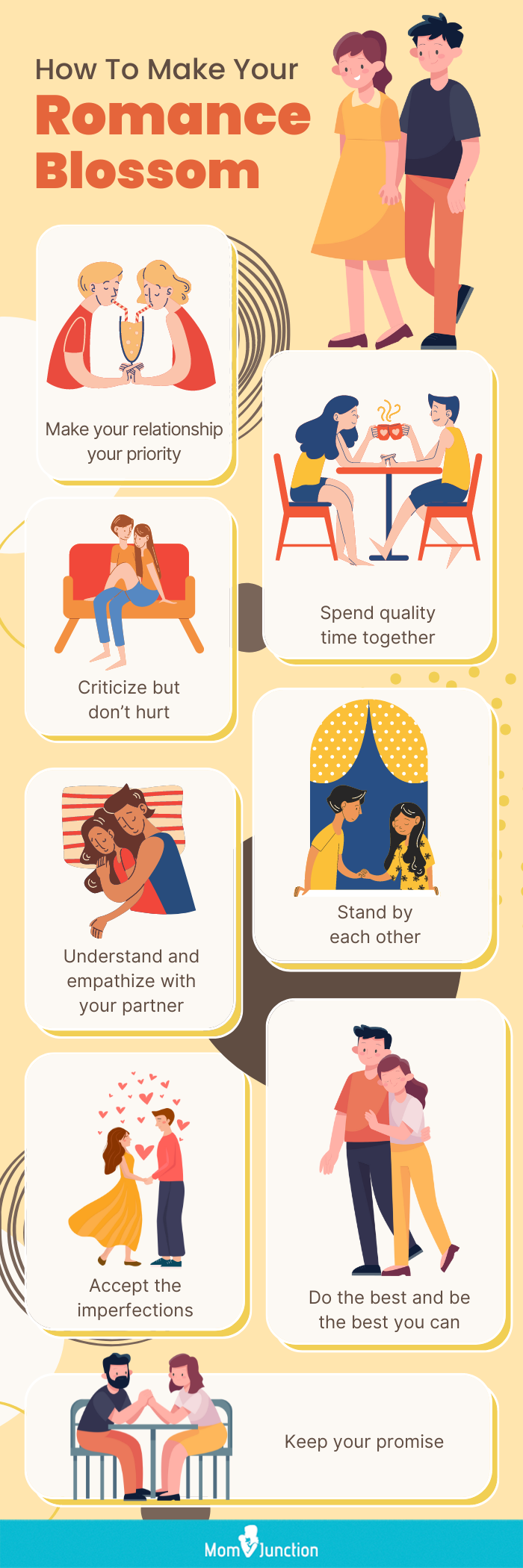
Image: Midjourney/ MomJunction Design Team
People often rush into a relationship without having clarity about what they want and what their partner is expecting. If you want to be in a fulfilling relationship, you may want to know the basic relationship rules. In relationships, rules are “prescriptions that, if obeyed, should reduce the destructive nature of some conflicts (1).” Unfortunately, many relationships experience a shift after the initial excitement, but with a clear vision and strong commitment, they can evolve into something deeper and more fulfilling. A relationship built on shared goals and dedication has the potential to thrive and grow. Hence, setting the right rules and following them without fail is imperative for a fruitful alliance. These rules help couples connect more deeply and deal with the challenges that come up in relationships. Following these basic principles makes it easier to build a supportive and understanding partnership where both people can grow. In this post, we discuss the basic rules that help you have a healthy and long-lasting relationship.

Key Pointers
- Demonstrate unconditional support and commitment in your relationship.
- Ensure clear and open communication is maintained in your relationship.
- Invest time in engaging in meaningful activities that strengthen your bond and bring you closer.
- Foster trust by being honest, forgiving, and approaching disagreements positively and constructively.
Why You Should Have Relationship Rules
Relationship rules are essential to create a framework for understanding and maintaining a healthy relationship. Let’s see why relationship rules matter:
- To establish boundaries and expectations and lay the foundation for trust and respect. Boundaries are meant to safeguard our well-being and play a crucial role in fostering trust, safety, and respect within relationships (2).
- It will deepen your bond. For instance, make it a rule to cook alternatively and do the dishes together.
- To avoid misunderstandings and conflicts among couples. For example, discuss your monthly budget and create a tentative budget for the subsequent month.
- To build a positive and appreciative atmosphere in the relationship, where both partners feel valued and understood.
Note that relationship rules should be flexible and based on mutual respect with an intention of well-being for both.
How To Set Relationship Rules
Establishing rules is crucial for a healthy and happy relationship. Here are key steps to set such rules:
1. Discuss healthy boundaries: Have open communication about personal boundaries and find constructive ways to handle them. It’s essential to communicate your preferences, limits, and comfort levels with your partner or friend. Instead of formally discussing all boundaries at once, these are usually shaped naturally over time through regular conversations and interactions (3). Address unhealthy boundaries by understanding the root issues. For instance, if there’s a concern about excessive video gaming, set limits like specific gaming hours or completion of chores before playing rather than banning it outright.
2. Differentiate between wants and needs: Ensure both partners express their wants and needs, promoting understanding and respect. A fulfilling relationship considers the desires of both individuals beyond just physical intimacy. Discuss and establish these wants and needs to create a strong foundation.
3. Plan for various scenarios: Anticipate potential challenges like job changes or breakups and establish rules for handling them. Having a plan for unexpected situations promotes clarity and helps you navigate tough times.
4. Create a safe space: Love should be a source of joy, not anxiety. Establish rules that create a safe space where mutual respect and understanding thrive. A healthy relationship is about giving, not just taking. It’s a haven where partners appreciate and uplift each other, creating a positive and loving environment.
5. Check and update your rules often: Relationships change, and your rules should too. Take time to sit down with your partner and talk about what’s working and what might need to be changed.
Relationship Rules For Every Couple
Whether you are just entering a relationship or have been in one for some time, rules help you take it to the next level. Follow the below rules and see the magic work:
1. Love with no conditions whatsoever
Love cannot have conditions. It becomes all too materialistic when “only ifs” seep into your relationship. Maybe they’re going through a tough time and aren’t their best self. Instead of pulling away, you tell them, “I’m here. No matter how hard it gets, I’m not going anywhere.”
You cannot have conditions like you can only love if your partner earns more than you, if he buys you gifts every month, if she looks beautiful always.
Love your partner as your parents love you – unconditional.
2. Your relationship is your priority
Make your relationship your topmost priority. Invest time and effort in your relationship and constantly strive to make it better. When disagreements arise, you say, “Let’s talk this through calmly,” instead of ignoring it. You remind each other, “We’re a team,” before making big decisions, ensuring mutual respect and effort always come first.
3. Keep your communication channel open
Without communication, you can drift apart in your relationship. Let your communication be open and honest. No matter how busy or tired you are, don’t let that block your communication. Open communication means sharing feelings, even the small ones. Saying, “I need to talk” or “How do you feel about this?” keeps the connection alive.
According to a report published by the Personality and Social Psychology Bulletin, negative communication is closely tied to relationship satisfaction. When couples engage in less negative communication than usual, they tend to feel more satisfied in their relationship. However, positive communication was not consistently linked to satisfaction (4). This highlights the importance of reducing negativity as a key relationship rule every couple must follow.
4. Hug as often as you can

Include it in your daily routine and make your hugs last longer. Hugging increases the oxytocin (the love hormone) levels and reduces cortisol ( the stress hormone) (5). After a stressful day, wrapping them in a hug says, “I’m here for you.” Make hugs a daily ritual to stay connected.
5. Have sex generously
Don’t schedule sex, let it be impromptu. That’s when it becomes exciting and the intimacy between you grows. Don’t let any excuses come in your way when it comes to having sex.
6. Spend quality time together

You need not necessarily go on a date night. You may also have a romantic dinner at home, just sit in the garden or balcony and rewind your memories or watch your favorite TV program together. Every evening, set aside an hour to disconnect from distractions. Say, “Let’s put our phones away and just talk or watch a show together.” Cook dinner as a team or take a walk, holding hands. The idea is to take a break from your busy schedules to stay close.
7. Be honest and truthful to build trust
Trust in a relationship is based on honesty and truthfulness. When your partner asks how you’re feeling, be truthful: “I’m upset because I felt unheard earlier.” Honesty strengthens trust. Avoid sugarcoating or hiding things, like saying, “Everything’s fine,” when it’s not.
Occasional minor and harmless lies are permitted to keep your partner happy but cheating and lack of fidelity have no place in a relationship.
 Quick tip
Quick tip8. Criticize but don’t hurt
If you want to criticize your partner to make them better, then the criticism should be constructive and positive. When giving feedback, focus on the issue, not your partner. For example, say, “I feel hurt when plans change at the last minute. Can we discuss it earlier next time?” Help your partner understand the intention behind the criticism.
9. Have a healthy argument

Arguments can be healthy as long as they are not constant and hurtful. You can agree to disagree peacefully. You and your partner disagree about finances. Instead of blaming, you say, “I feel stressed when we overspend. Can we plan a budget together?” They respond, “I understand. Let’s set limits that work for both of us.” Healthy arguments focus on solutions, not accusations, and strengthen trust and mutual respect. Make it a habit of listening actively and arguing less. That shows your respect for each other.
10. Stand by each other
We hope tough times do not touch your lives, but it’s during these times you have to stand by your partner and prove your unflinching love for each other. That’s when your relationship strengthens. According to a report published in the journal Health Psychol, studies show that providing support to a partner, whether through active help or emotional support, can lead to better emotional well-being and fewer physical symptoms for the caregiver (6).
Lauren Hall, wife, mother, and writer, emphasizes that the strongest relationships are the ones that navigate through challenges together. She shares, “In my marriage, emotional and mental health issues have crept up more often than physical ailments. Not to mention addiction. I’m not ashamed of this; I’ve spoken about it multiple times. Three years ago, I had my last Drink. My alcoholism sucked away fifteen years of my life, but thanks to sobriety, it’s not over yet. My husband had every right to leave me during those years. Every. Right. But he never did. He came close a few times; he’s human. But he never left and when I asked him why he didn’t, he just reminded me about our vows. He reminded me about how important we both felt they were and how important it was to keep our relationship healthy for our child (at that point, we had just one) (i).”
11. Appreciate the good things in your partner
No matter how simple or routine the task, appreciate your partner and thank them for everything. When your partner cooks dinner, say, “I love how you always make meals with so much care. It means a lot to me.” If they support you after a tough day, express, “I appreciate how you listen to me; it makes me feel so loved.” Small acknowledgments strengthen bonds. It shows you respect and value them, which is essential for a long-lasting relationship. A study showed that when spouses perceive their help is appreciated, it enhances their emotional state and relationship satisfaction (6). These findings highlight the importance of mutual appreciation in relationships, a key aspect of relationship rules every couple should follow.
12. Take and give some personal space
Proximity does not mean getting clingy with your partner. Give them their personal space, leave them alone for sometime in a day, and let them unwind the way they want. Similarly, make sure you are getting your share of me-time to pursue your career, hobbies or just relax.
13. Celebrate the special days

Do not forget the important days in your relationship – the day you first met each other, your first date, the day your partner proposed to you, and of course your birthdays and wedding anniversary. Celebrate your togetherness and create cherishable memories.
14. Understand and empathize with your partner
If your partner is having a bad temper on a day and shouts at you, show empathy, and control the temptation to answer them back in the same tone. They might have had a tough day at work or be feeling stressed. When they seem upset, listen without judgment and acknowledge their emotions. “I can see you’re really stressed; how can I support you?” Understand their perspective, empathize with them, and when the time is apt, find out what is bothering them.
15. Forgive and forget
Mistakes do happen. If your partner hurts you, forgive him/her and forget about it. Forgiveness will encourage them to do the same when you make a mistake. Forgiveness in relationships is linked to higher satisfaction, as it leads to more effort and less conflict. Two studies show that forgiveness enhances relationship satisfaction by improving both relational effort and reducing negative conflict. This highlights the importance of forgiveness in maintaining healthy relationship dynamics (7).
 Point to consider
Point to consider16. Show interest in your partner’s hobbies activities

Does your partner follow a sport that you find boring? You don’t have to tell them that. Instead, try to understand the sport, support them, and ask your partner about it. Show interest and indulge in your partner’s interests. You will begin to appreciate them.
17. Ask what you want
Don’t expect your partner to understand all your needs and wants. Telepathy will not work all the time. If you need something, just ask for it instead of simply keeping quiet and hoping that your partner will meet all your expectations.
18. Accept the imperfections
Nobody is perfect! Accept your partner with all their perfections and imperfections. Relationships are about being the right partner, not the perfect partner because perfect doesn’t exist.
19. Keep your promises
That makes you trustworthy, reliable and increases your credibility.
20. Do the best and be the best you can
All of us are vulnerable to criticism and fear – the fear of doing something wrong and being criticized for it. Give your best to your relationship irrespective of your partner’s reaction. It is only so much you can do; the way your partner reacts to it is not in your control.
Rules are not just about doing something right; they are also about not doing certain things.
Additional Tips For Lasting Relationships
Lasting relationships are built on unconditional trust and love. To further strengthen your relationship, you can implement these rules.
- Practice active listening: Pay attention when your partner voices out their opinions and show that you understand their point of view. Validate their feelings. In the journal Current Opinion in Psychology, a group of psychology scholars mentioned that active listening can build trust and make a partner feel understood, validated, and cared for. Good listening promotes openness and honesty, which are crucial for strong relationships. They further mention “Perhaps due to greater trust and perceived responsiveness, speakers are more willing to honestly disclose when listeners exhibit high-quality listening” (8).
- Share responsibilities: Work on household chores and make decisions together to create a sense of teamwork and fairness.
- Show appreciation regularly: Appreciate whatever your partner does to help you, no matter how small. It shows them that you care and make them feel loved.
- Spend quality time together: Spending quality time together is one of the most important things to ensure a lasting relationship. Make time for each other in your busy schedules, put away your phones, and be present in the moment.
- Support each other’s goals: Encourage and support each other in your personal and shared ambitions. Be by each other’s side during tough times and keep cheering each other on.
Things You Should Not Do In A Relationship
In any relationship, maintaining respect and trust is crucial for lasting happiness. Certain behaviors and actions can undermine these foundations, so it is important to avoid them for a healthy, thriving connection. Here are some of the things to remember.
- Discussing past relationships and exes: Constantly bringing up the past can prevent both partners from fully investing in the present relationship. It can also lead to feelings of distrust or discomfort, especially if one partner feels overshadowed by the history of previous relationships.
- Taking your partner for granted: Failing to appreciate their efforts and valuing them less over time can lead to emotional distance and resentment in the relationship.
- Going to bed angry: This can create emotional distance and unresolved tension in a relationship. It’s important to address conflicts before bedtime, as holding onto anger overnight can affect your connection and lead to lingering resentment.
- Striving to be a perfect partner: It might lead to unrealistic expectations, self-neglect, or pressure to meet ideals that aren’t practical. It can create a dynamic where one feels they must constantly prove themselves, leading to burnout or resentment.
- Trying to fix or change the person: Trying to fix or change your partner undermines their sense of self-worth and individuality.
- Discussing issues with friends or family: Discussing relationship issues with friends or family leads to outsiders forming opinions or judgments about your partner. This can create misunderstandings, foster resentment, and breach trust between you and your partner.
- Losing patience during arguments: Losing your patience during arguments can escalate conflicts and make it difficult to reach a resolution. When emotions take over, it’s harder to listen and understand your partner’s perspective, leading to hurtful words or actions.
- Ignoring your partner’s emotional needs: This can contribute to feelings of neglect, loneliness, and resentment. When emotional needs are unmet, it creates a gap in communication and connection, weakening the bond.
It might sound clichéd, but relationships require effort, time, and love. Simply put, the more you nurture your relationship, the better it blooms.
Frequently Asked Questions
1. How can I build trust in a relationship?
Both partners must be honest about their feelings and should listen to one another without judging. It should be teamwork. The couple must have open communication that gives scope for a better understanding of one another.
2. What are some strategies to resolve conflicts in a relationship?
An apology is the first step to resolving a conflict. The other partner must listen patiently and be willing to forgive, considering they may also make mistakes. Identify the issue and be open to compromise.
3. How can I handle jealousy in a relationship?
To tackle jealousy, you must build trust, create healthy boundaries, spend quality time with one another, and keep open communication. Remember that jealousy is common and normal. But nip it in the bud before it gets too hard to control.
4. What are the consequences of violating relationship rules?
When you do not take your relationship seriously, it is bound to crumble sooner or later. Violating relationship rules can make you and your partner grow apart and distant. It can cause irreparable damage to the relationship.
5. How can relationship rules help manage conflict?
Observing relationship rules, forgiving and forgetting minor mistakes, respecting personal space, maintaining loyalty, having healthy arguments, and keeping an open communication channel help resolve conflicts.
Following certain relationship rules can help you strengthen your bond and make the relationship stand the test of time. There can be issues when there are no rules once the initial excitement of being in a relationship wanes. Spending quality time together, sharing responsibilities, prioritizing the partner, being honest and truthful, and loving each other without conditions are the basic factors that tighten your relationship. Giving personal space, appreciating each other, and good communication helps to avoid any issues in relationships and let each partner maintain their self-identity.
Infographic: Relationship Rules Every Couple Must Follow
A relationship requires both partners to put in the effort to keep it running smoothly. Also, there are rules that both of them need to follow to ensure that they are on the same page and make things work. In the infographic, we present fundamental relationship rules you should know. You may share them with your partner also. Illustration: Momjunction Design Team
Illustration: Basic Relationship Rules That Strengthen Your Bond

Image: Dall·E/MomJunction Design Team
Personal Experience: Source
MomJunction articles include first-hand experiences to provide you with better insights through real-life narratives. Here are the sources of personal accounts referenced in this article.
i. These unbelievably simple rules are the key to marital bliss.https://medium.com/hello-love/these-unbelievably-simple-rules-are-the-key-to-marital-bliss-149aac71b228
References
1. In the Game of Love, Play by the Rules: Implications of Relationship Rule Consensus over Honesty and Deception in Romantic Relationships; University of Montana
2. How is Life Tree(ting) You?: Trust, Safety, and Respect – The Importance of Boundaries; Stanford University
3. Setting Boundaries in Relationships; Guidance Resources
4. Within-Couple Associations Between Communication and Relationship Satisfaction Over Time; Personality and Social Psychology Bulletin.
5. The benefits of hugging; Science in our World: Certainty and Controversy.
6. Spouses’ Daily Feelings of Appreciation and Self-Reported WellBeing; Health Psychol 2017 December
7. Forgiveness and Relationship Satisfaction: Mediating Mechanism; J Fam Psychol. 2011 August 8. Listening and the pursuit of communal relationships; Current Opinion in Psychology
Community Experiences
Join the conversation and become a part of our nurturing community! Share your stories, experiences, and insights to connect with fellow parents.
Read full bio of Dr. Carlos Juan Carmona-Goyena
Read full bio of Kalpana M
Read full bio of Shikha Thakur
Read full bio of Benidamika J Latam
















